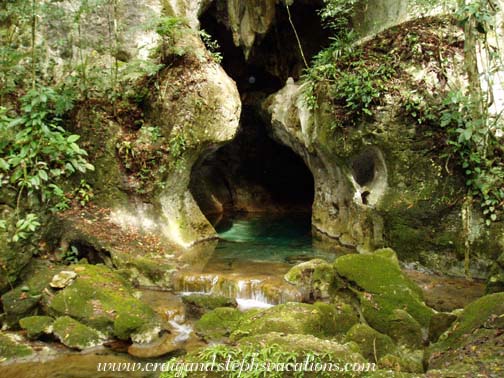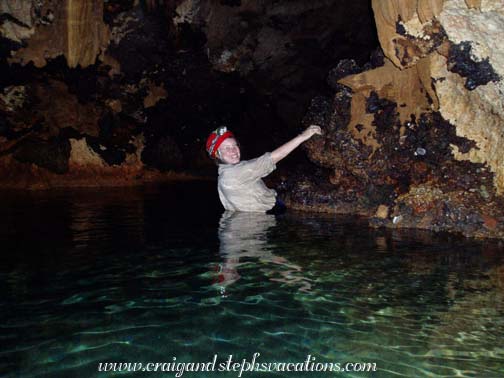We woke up at around 5 am and got ready for the day. We headed down to breakfast for 6. We had juice, scrambled eggs, black beans, and toast. At around 6:40, we left for our hike to Actun Tunichil Muknal, the Cave of the Stone Sepulchre. The hike started in the woods near Pook's Hill, continued through an orange grove, through Mennonite bean and corn fields, and then through the jungle to the mouth of the cave. Throughout the course of the hike we had to cross Roaring Creek several times. On the way there we saw birds, a small brown toad, and a 6-inch marine toad, whose secretions are hallucinogenic. We also saw a wide variety of plants and trees including seeing our first rubber tree. The hike was basically flat and the weather was very pleasant. You could tell that the hike would be much more difficult in rainy weather as the dirt began caking on to our shoes. It seems that the mud gets very deep when wet but fortunately there were just occasional puddles that were easily avoided.
After about two hours we reached the mouth of the cave. There was a camp area with picnic tables, a fire pit, a thatched roof shelter, and an outhouse. Here we got our gear together for the cave. We were wearing travel shirts and shorts. Ben carried a dry bag within a backpack to keep our important things dry and safe. Our anticipation mounted as Ben was trying to give us more background information about the cave but we found it difficult to concentrate at this point. Standing at the mouth of this cave, with all of its history, was simply too much so we pressed onwards hoping to beat the inevitable hikers that would follow us.
The mouth of the limestone cave was gorgeous. There was a pool of clear blue water at the entrance, with many tiny fish swimming in it. We plunged into the water. It was deep enough that we couldn't touch the bottom. We swam inside the cave. It felt chilly at first, but we soon got used to the temperature. We had to wear sneakers to protect our feet. We then hiked through the cave, scrambling up and down some rocks, sometimes chest-deep in water, other times ankle-deep in water, other times on dry land. There were some beautiful limestone formations (stalactites, stalagmites, and calcified flows that glittered in the light from our headlamps).
We made our way to "the cavern", the sacred site where ancient Mayans used to perform rituals. The first thing we did was to remove our shoes. The cavern is sacred ground and we needed to proceed in our stocking feet. There were ritually broken pots (and even some intact pots) scattered all over the cave. It is thought that the Mayan people would come into this cave to pray for water and rain so the pots were very significant. The valuable polychrome pots had been removed to museums for safekeeping. Nonetheless, it was impressive how many monochrome pots were still there. Some were perched on "altars" and others were just littered on the floor. Unfortunately, visitors to the cave have recently trampled some. Every step needed to be carefully chosen to avoid causing any damage to pottery shards. It was nice being such a small group. It seems that larger groups tend to do more damage as there just isn't enough room in some places to ensure everyone is in a proper location. Some of the pots were calcified, making them appear to be thicker. We saw a couple of skulls and a few scattered bones. Everywhere we looked in the cavern there was some artifact to behold. The crowning glory required a climb up an aluminum ladder and onto a rock ledge. Once up there, we found ourselves in a "stone sepulchre" (the cave's namesake) and there was an entire skeleton of a young woman known as the crystal maiden. Sacrificial victims in the cave were either decapitated or their hearts were extracted. We managed to see everything before other tour groups caught up with us, which was nice. There were also various formations that when lighted from one side appeared to cast shadows looking remarkably similar to the various images of Mayan gods. We wondered whether or not this was significant to the Mayan people that entered the caves with their torches and fires.
We put our shoes back on, rested for a few minutes while eating a Snickers bar, and finally exited the cavern area. The camera had been safe in the dry bag on the way into the cave, but we wanted some pictures of our hike back out. So Craig carefully held on to the camera until the final swim, at which point he put it back into the dry bag. When we exited the cave, we ate the lunch that Pook's Hill had packed for us: turkey sandwiches, hard boiled eggs, and fruit cake. As always happens when hiking or exploring, it all seemed like the best food in the world! We had spent about 4 hours in the cave, but it hadn't seemed like that long. We would have happily stayed for a few more hours exploring every nook we could find. Not only was it simply stunning inside this cave, but it was also a significant location for the local Maya people.
We hiked straight back to the lodge. Noone said much; we were all just contemplating the day's activities. While still in the jungle portion of the hike Craig got stung by a wasp of some kind on the back of his ankle. Although causing a sharp pain at the time there were no visible signs of a stinger or any swelling afterwards and it was soon forgotten. We arrived back at Pook's Hill at around 3. We stopped at the bar and had a drink while discussing the incredible day we had. Wim seemed to really enjoy seeing the looks on our faces and hearing our stories about the hike.
Ben got out a bird book and showed us all of the birds we had seen in the past two days. Feel free to skip this paragraph entirely if you are not interested in birds. The birds we had seen so far in Belize were the bare throated tiger heron, black vulture, turkey vulture, plain chachalaca, grey neck wood-rail, ruddy ground-dove, red-lored parrot, little hermit hummingbird, rufous-tailed hummingbird, keel-billed toucan, colared aracari, blue crowned motmot, ringed kingfisher, green kingfisher, Amazon kingfisher, ivory billed woodcreeper, sulphur bellied flycatcher, northern rough winged swallow, brown jay, clay colored robin, red throated ant tanager, white collared seedeater, montezuma oropendula, grey tailed grackle, yellow tailed oriole, orchard oriole, social flycatcher, cattle egret, indigo bunting, and fork tailed flycatcher. Although we saw many others, these were all the ones we could properly identify in the guidebook.
We took showers and swung in the hammocks in the common room for a while. We were allowed to check our email on the office computer, and we finished with that at around 6:15. Then we sat near the bar, chatting with Ray, Vicki, Chantal, and Wim. We were the only guests tonight and they really treated us like family. At 7:30 we all ate together. The main course was fish tonight; Craig had grouper and I had snapper. We also had rice and beans, potatoes, and sauteed vegetables. After dinner we went up to the bar area and sat chatting for a while. We went to bed at around 10.
|






|






